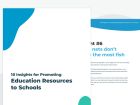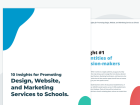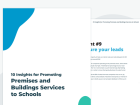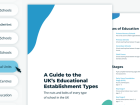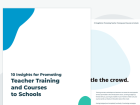The Education Landscape is Changing: Summer Term Predictions
The Education Landscape is Changing: Summer Term Predictions
Read our research, school calendars, and the latest breaking news stories to see how our summer term predictions affects your education marketing.
Read our research, school calendars, and the latest breaking news stories to see how our summer term predictions affects your education marketing.
How the Education Landscape is Changing: Summer Term 2022 Predictions
When you’re investing so much time and money into your education marketing efforts, learning on those consistent, reliable events in the school calendar is a welcome respite. Budget releases, half-term holidays, and cyclic purchasing behaviours are unwavering year on year, making it easy for you to carry your standard marketing approach into a new year of selling to schools.
But, as we all know, the education landscape is always changing. Even before the chaos of the pandemic and school closures, schools were never free of unexpected funding cuts, Ofsted announcements, or government curveballs that threw their carefully planned curriculum out the window.
It’s vital you keep up-to-date with these changes, so you can shape your marketing, products and services, and support accordingly. This’ll help you stay relevant in the current climate, and stay one step ahead of your competitors by letting teachers know you’re here for them, and can deliver the support they need to navigate the school year.
To help, we’ve analysed our research, studied the calendars, and poured over the latest breaking news stories to pinpoint our predictions for the upcoming summer term, and help you stay at the forefront of your industry.
Spending Increases
For the last two years, we’ve published our chart-topping State of Selling to Schools research report. A major section of these reports have focused on schools’ spending, giving our clients an accurate idea of the state of purchasing in schools, and how this is set to change.
In 2021, schools told us their top three spending increases were online learning and tutoring (26.7% of schools), Additional Learning Support (26.2%), and Supply Teachers (23.9%). As we’ve covered, the education landscape is incredibly rocky, but if there’s one thing that’s consistent, it’s teachers’ dedication to upholding high levels of learning and attainment within their facilities. So, if we had to make an educated guess, it’s not a stretch to assume all three of these areas would still see significant spends during the summer term. … But, with our 2022 release of our research report, we don’t have to guess!
When we asked educators the same question this year, the results were really in the same vein. Additional Learning Support, Technology, and Training came out as the top three areas for spending increases (at 30.4%, 24.4%, and 22.6%, respectively). It’s clear that addressing the lost learning and attainment gaps as a result of the pandemic remains a key priority for schools, and this summer term will. With the government’s additional catch-up funding extending into the 2024/2025 school year, it’s likely to remain one of school’s top spending areas for the next few years.
While technology was a tad lower down on the list of school’s spending increases in 2021 (in 22.8% of schools), it’s no surprise that it’s climbing the ranks this year. Online learning has seen a huge boom in schools, and with many of the aforementioned additional learning support products and services offering online or blended learning options, schools are taking advantage of this where possible and upgrading their technology to support this. EdTech products and services have continued to release thick and fast, with some incredible, game-changing offers available to schools right now. Be it affordable 1:1 devices, fun devices to teach coding, or even a revolutionary school admin software suite, the possibilities are endless – and schools are ready for their share.
On the more practical side of things, schools were some of the worst places hit by the pandemic, having to completely abandon their curriculum and rely significantly on virtual learning (literally) overnight. While we all hope that the worst of COVID is behind us, schools know all too well the effects on learning, wellbeing, attainment, and workloads as a result of unforeseen emergencies. Many schools are (if they haven’t already) putting into place measures to ensure they can switch back to online or blended learning at the flick of a switch.
… And Spending Decreases
Jumping back to our 2021 research, the top three areas of spending decreases were Supply Teachers, Training, and Outdoor Learning (in 17.7%, 12.4%, and 10.1% of schools respectively). The first two are quite surprising, giving these were also the top areas other schools increased their spending, and doesn’t really give us any solid evidence to predict the 2022 landscape. Outdoor learning, on the other hand, is no surprise given the lockdowns and restrictions. While these have largely lifted, many schools are still playing it safe to some degree and keeping some light COVID restrictions, so there’s a chance this could still be high up on the list.
Sure enough, in our 2022 research, we uncovered that schools said their spending would likely decrease in these top three areas: Supply Teachers (14.8% of respondents), Online Learning/Tutoring (8.6%), and Outdoor Learning (6.9%). It’s worth keeping in mind that this survey was conducted back at the tail end of 2021, when the Omicron COVID variant was rearing its head, and mini-lockdowns weren’t out of the question. Schools wouldn’t want to make purchases on things they’d potentially be unable to use if restrictions returned, such as Outdoor Learning equipment, and, if home learning returned, there would be a smaller demand for Supply Teachers.
With the worst of Omicron behind us, it’s not out of the question that spending in these areas will rise again, particularly for Outdoor Learning products and services as we head into the warmer weather.
Another interesting point about these stats is the actual percentage. These have fallen compared to the 2021 decrease estimates, and are much lower than both years of increase estimates. What this tells us is schools simply aren’t as sure of the areas they’ll decrease spending, compared to those they’ll increase spending. And this is perfect news for education businesses, because it means they’re less likely to have completely ruled anything out.
Their main focus is on spending, rather than saving, which is exactly what you want to hear!
If we had to make a prediction, though, these results seem to tie in with a decrease in spending in areas of the National Tutoring Programme. Online Learning, Tutoring, and external members of staff were covered by this bout of government funding, but, from our knowledge, an awful lot of schools have already allocated or even used up all of this year’s funding. The funding will be returning for the 2022-2024 academic years, but at a lower subsidy rate (50% in 2022/2023, and 25% in 2023/2024, compared to this year’s 70%). While it’s still a fantastic offer for schools, it’s likely the uptake on this will fall each year.
Purchasing Decisions
For any education business, knowing when schools make their purchasing decisions, and the efforts that go into them, unlocks so much selling potential. If you know who to contact and when, you’ll be getting the most out of your marketing efforts and making the very best use of your marketing budget, and so you will likely see a greater ROI.
In our State of Selling to Schools report, we asked schools which months of the year their bigger purchasing decisions are made. The summer term months were highest up in this list, with June and July coming in second and third place respectively after September.
Of course, to make these bigger purchasing decisions later in the summer, schools will need to start considering their options earlier – in March, April, and May.
In the coming weeks, schools will be starting the consideration and negotiation process with education businesses for those bigger purchases they’ve got planned. If they’re looking to pad out their playground equipment with a few new climbing frames, or to upgrade their classroom management software, they’ll ideally want to get these installed and rolled out over the summer for minimal disruption. So, in the summer term, the SMT and potentially the school governors will be sitting down to discuss their requirements, researching education businesses to see who can best meet their needs, and negotiating with these companies on pricing and payment plans.
What you need to do this summer term is make sure you’re getting your products and services right under teachers’ noses at this key purchasing period. Even if your offering would be considered a smaller or inexpensive purchase, it’s not time to rest – with schools in ‘buying mode’, they’ll be in the right frame of mind to consider your purchase, and may even be able to link it to one of their larger purchases for greater leverage.
Goals and Priorities
Going back to our impact report, 65.3% of schools told us they’re prioritising improving learning and results this year, 58% are prioritising supporting emotional and mental wellbeing, and 53.9% are prioritising reducing the learning loss attainment gap. None of these come as a surprise – as we’ve covered, the pandemic has left a huge dent in pupils’ learning outcomes, and, of course, staff and student wellbeing. The increase in spend discussed earlier goes hand-in-hand with these goals for this year.
This combination of stats makes one thing clear: we don’t have to guess what schools will be buying this term. Up and down the country, schools will be looking for any product or service that’ll help them increase results and nurture staff and student wellbeing, from any education businesses who understands this situation.
If your education business can offer this, make sure to hit the key consideration period between now and April, ready to hit the summer spending period. Start planning your own education marketing campaigns using Campus, our education-focused CRM, or ask our education experts to plan, create, and send your series of emails on your behalf.
International Education
In addition to our Selling to Schools results, a few other breaking news stories from this term will affect the education landscape. A new research report has revealed the recruitment and CPD trends driving international school recruitment. In the last five years, the demand for international teachers has grown from 447,000 to 555,000 – and it’s easy to see the appeal for UK teachers to fill these gaps. Be it the greater work-life balance, wages, career development opportunities, or simply the weather, more and more teachers are considering a move abroad.
Of course, it’s not only UK teachers who’ll fill these positions – recruiters are putting a larger focus on a more diverse workforce, and local teaching staff are increasingly valued for the cultural knowledge and language skills they bring to the school. There’s also a huge call for teachers proficient with EdTech to support learning, and many schools are prioritising their CPD offering to recruit and retain staff.
There’s a lot of information there that’ll mean many things for schools, albeit on a smaller scale than their funding and goals for 2022. The main takeaways are, of course, for recruitment companies, who can most certainly take their share of this market by supporting both UK teachers moving abroad, and the international schools looking for local and UK talent.
But, there’s a takeaway for many more businesses here: CPD is an important focus for staff and schools worldwide, and more needs to be done to provide excellent opportunities. If you can offer CPD courses or other methods of support, this is something to keep an eye on!
In keeping with the theme of international education, the Department for Education has announced its iQTS teaching qualification pilot programme will begin this September. The International Qualified Teacher Status will be initially delivered by five ITT providers, who’ll provide a mix of remote teaching, in-school placements with international schools, assessments, and mentor feedback.
The iQTS can be achieved by UK citizens working abroad wishing to become a teacher, or non-UK citizens who want to gain sufficient qualifications to work as a teacher in either an international school, or move to the UK to work in education. This will also tie in to a new DfE law, which will allow the government to approve an iQTS holder to work in England as a teacher with Qualified Teacher Status.
Although this year’s uptake will be small, given it’s only the pilot programme, it is the first step to spreading England’s teaching standards across the world, which will shape both the UK and international education landscape in years to come.
In the short-term, more news about this programme will support the UK and international recruitment drive, which is more great news for those businesses, as well as prompt already-qualified teachers to consider a move abroad as those around them discuss the benefits.
This could result in teachers moving ahead of September, so be on your toes if your products or services can help here.
Moreover, ITT providers will need to stay prepared should they wish to put themselves forward for the next cohort if the pilot programme proves a success. Joining such a new yet influential programme will put you one step ahead of your competitors, as well as show teachers you’re a cutting-edge business who remains at the forefront of education innovation.
What’s next?
If you’ve not quite got your summer marketing plan, well, planned, don’t worry. Our education experts are on-hand to help tailor your perfect strategy to meet these unmissable events, and show schools you’re always on the ball and ready to help them this term, no matter what’s going on in the education industry.
Give us a call on 01684 297374, or email info@sprint-education.co.uk, to discuss our managed strategies or education-focused CRM, Campus.
Tags
Education Marketing
Education News
Email Marketing
Selling to Schools
Similar Articles
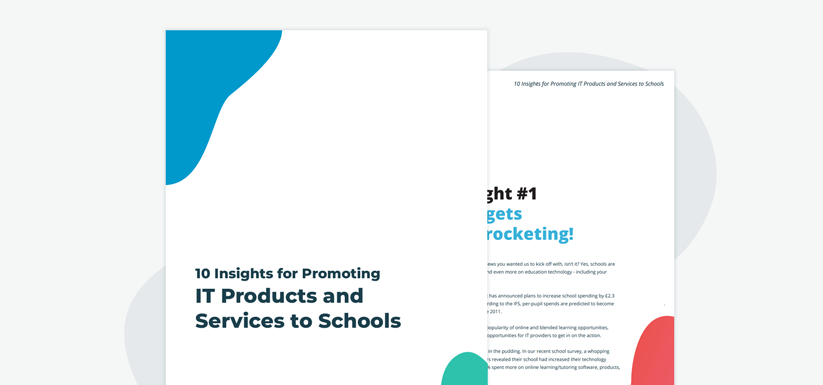

Marketing IT Products and Services to Schools
Learn 10 game-changing insights especially for IT product and service providers to enhance your education marketing campaigns when emailing schools.


Marketing Trips, Tours, and Travel to Schools
Learn 10 game-changing insights especially for trips, tours, and travel providers to enhance your education marketing campaigns when emailing schools.


Expert marketing to schools support and solutions
Expert marketing to schools solutions
Email Head Teachers, Teachers, and Staff Inboxes
Email teachers and staff inboxes
Sell More to UK and Global Schools and Colleges
Sell more to schools and colleges
























